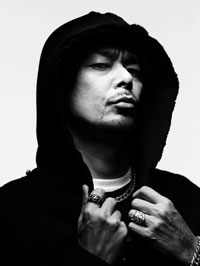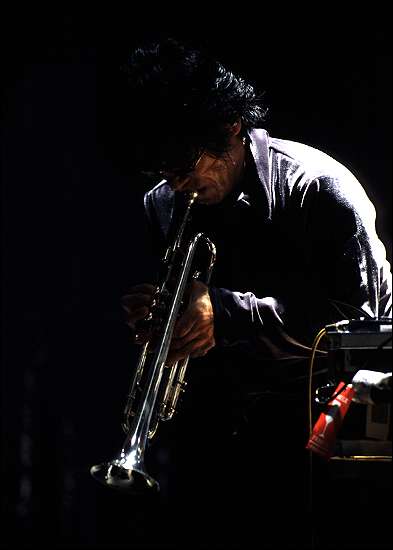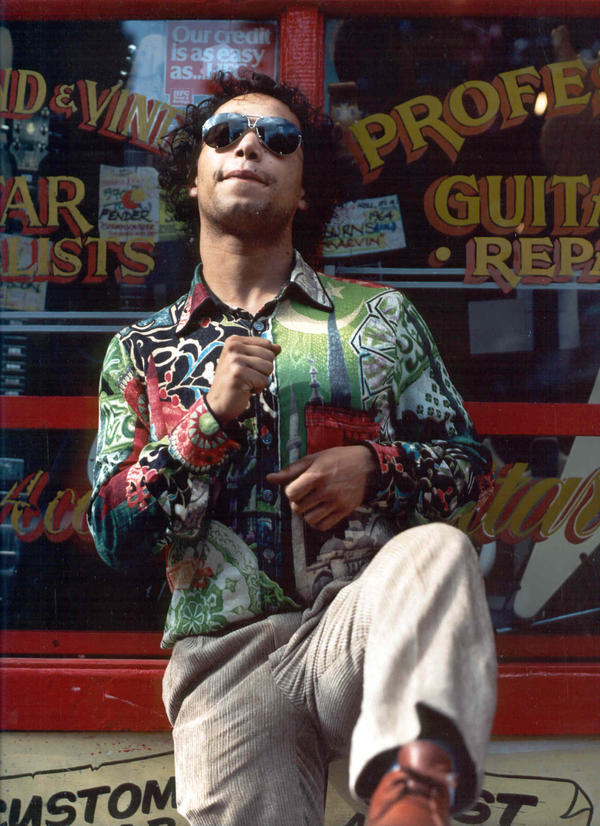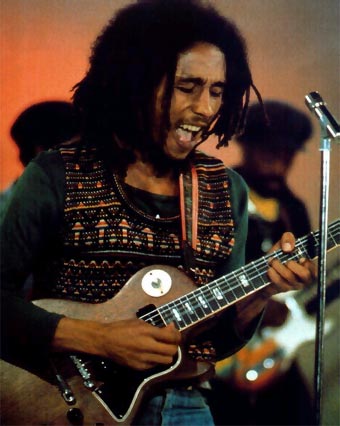FINLEY QUAYE / “Sunday Shining”
He displays gems and jewels, precious rare things. He talks about certain things, certain feelings that are natural and human and that are required and always sought after but are often suppressed.
—Finley Quaye on Bob Marley

I haven’t heard much of The Wailers’ early music (meaning, pre-Island Records and Chris Blackwell), but based on the austere beauty of their 1971 version of “Sun Is Shining,” maybe I should. Particularly when compared to the lush, full feel of the more famous 1978 remake (from Kaya), the original is almost monastic in its simplicity. The bass/drum/keyboard groove is very sparse and clean. The only other instrument I hear is a high-pitched flute (or is that a melodica?). This version of “Sun Is Shining” is a Wailers track, supposedly, but realistically, it’s a Bob Marley solo—neither Bunny Wailer nor Peter Tosh (the other two Wailers) are audibly there on this selection from Soul Revolution. For me, the absence of harmony gives Bob’s lyrics an introspective ‘aloneness’ that may or may not have been entirely intentional.
Judging from the stripped-down nature of the groove and the meditative feel of the horn lines, I’d bet either DJ Krush or Toshinori Kondo dig the early version too.

Hideaki ‘DJ Krush’ Ishii is a DJ and producer out of Tokyo who specializes in hip-hop and electronica. Krush is one of the pioneers of hip-hop in Japan; his discography includes eight releases under his name as well as numerous collaborations, remixes and production credits.

Toshinori Kondo is a Japanese trumpeter, writer and actor whose discography is even more extensive than Krush’s. Kondo has been a professional musician for over 30 years, recording everything from jazz to electronica to experimental music.
As I alluded to earlier, the Krush/Kondo version of “Sun Is Shining” (from Ki-Oku) is less a song than a meditation in sound. The arrangement is extraordinarily repetitive. In the same way that some people experience mental freedom within the confines of a mantra or chant, I listen to the over-and-overness of something like Krush & Kondo’s “Sun Is Shining” and feel lifted away from my common, everyday troubles.

The feature version is Finley Quaye’s “Sunday Shining.” Given the title of his debut album, Maverick A Strike, the Scotland-born, part Ghanaian Quaye is every bit the musical maverick you’d expect him to be. His version of “Sun Is Shining” is (as the reworded title implies) a radical departure from the original tune. The other three versions in the jukebox are mellow and easy. Quaye’s is rollicking and loud. Also, where the others stick to a fairly direct main melody, Quaye’s horn lines and guitar riffs provide a new counterpoint to Bob’s composition. Down to the rewritten (and perhaps improvised) lyrics, “Sunday Shining” is almost—but not quite—a new song. But whether re-worded or not, Quaye had the good sense to leave in Bob’s beautiful line about rainbows and mornings. You know the one: “When the morning gathers the rainbow / I want you to know, I’m a rainbow too.”
—Mtume ya Salaam
One never knows, do one?
You can never guess from whence and thru what vehicle the music will flow. I’ve got two or three Finley releases and from time to time I’ll give a quick listen—actually it’s more accurate to say I’ll hear some Quaye somewhere, unexpectantly, and when I inquire and I’m told it’s Finley, I say, of course, and remind myself I need to check this guy out again. The last time that happened was last year in an alternative café in the Bywater neighborhood of New Orleans. Anyway, I find that I always end up digging Quaye more than I remember digging him, and yes, he does have a Bob vibe about him.

So, Mtume, I don’t know if you’ve got the trivia on Quaye but here are a couple of gems. In Gaelic, his first name means “sunshine.” Finley is also your boy Tricky’s uncle. According to a write up on Mixmag.net, “Maxine Quaye, Finley's half-sister, was Tricky's mum and the trip-hop figurehead named his debut album after her.” And finally, Finley did some background vocals on one of Tricky’s albums. Make of all that what you will.
Also, Finley has a myspace account. Check him out (he’s living in Berlin now). There’s a photo of a detailed biography/obituary of Finley’s musician father, Cab, included in the photo section.

Meanwhile, a word about Bob and the Japanese. You know Bob is bigger than sushi in Japan, yeah, mon. So no surprise about the instrumental track. It’s got niceness written all over it. I was never a big, big fan of the Kaya album, so I only vaguely remember “Sun Is Shining.” Mtume, I give thanks that you dug up the early version because it is that which is worth writing about, supremely worth listening to. Maybe it’s my imagination, or my music-writing tendency toward exaggeration, but I swear I be feeling Bob’s smile beaming thru the track upful in my ear making me shout an affirmative response to Bob’s closing words when the track comes to an abrupt halt: yeah, man, I and I believe ya!
—Kalamu ya Salaam
This entry was posted on Sunday, July 16th, 2006 at 2:35 am and is filed under Cover. You can follow any responses to this entry through the RSS 2.0 feed. You can leave a response, or trackback from your own site.
One Response to “FINLEY QUAYE / “Sunday Shining””
Kiini Says:
July 18th, 2006 at 10:54 am
July 18th, 2006 at 10:54 am
As much as I like Finley Quaye, I don’t like what he did to Sun Is Shining. I don’t know if Bob Marley’s music is too iconographic for me, so “right” and “perfect” that i don’t want it to be f-ed with, but the horns, the blare, it didn’t wrok for me. i have to give it a thumbs down… but I’d like to hear more of Finley Quaye. Big thumbs up on him as an artist.
Leave a Reply
| top |